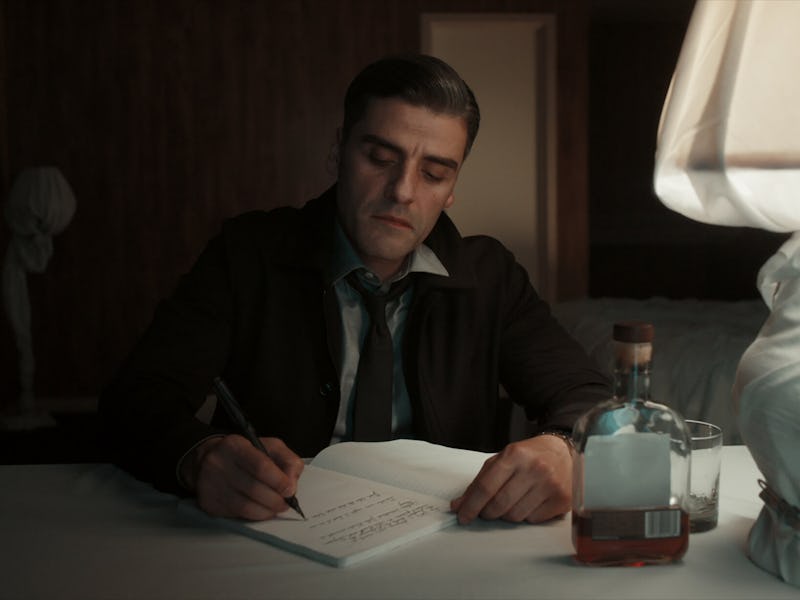The Quasi-Sequel to First Reformed Is Just as Thoughtful, Haunting, and Worthy of Your Time
Paul Schrader exhumes the ghosts of American imperialism.

Two decades after the Iraq War began, America is still grappling with the extrajudicial violence it committed. The ghosts created in the deserts and dungeons still demand justice, and the guilt of our actions crept into American media from the 2000s onwards.
There’s no one in Hollywood with a better grasp on guilt than Paul Schrader, whose filmography is dripping with blood and self-loathing. For the last 40 years, he’s been looking deep into the soul of American masculinity to examine the rot on the inside, and perhaps no film of his provides such a stark examination of how violence trickles down from institutions into individuals than his 2021 release, The Card Counter.
The second installment of his loosely-tethered “Man in a Room” trilogy (beginning with 2017’s First Reformed), Schrader’s lead in The Card Counter is William Tell (Oscar Isaac), an ex-military interrogator turned career gambler after a mysterious stint in prison. Isaac is frequently touted as one of the best performers of his generation, and his performance as Tell is a strong argument in his favor. The searing intensity behind his eyes and the detached intonation with which he explains the rules of poker and card counting suggests an intentional suppression of self.
In fact, we soon discover that everything about William is a purposeful attempt to destroy any trace of an interior life. He gambles daily but only on small amounts, to avoid the fame that comes with winning big. He lives out of two suitcases and stays in shoddy motels, taking care to wrap all the furniture in sheets to mimic the appearance of his nondescript prison cell. He journals (a trait shared by all of Schrader’s tortured men) with an intensity and rigor that suggests his actions are the ones of a man trying desperately to bury his guilt.
Men in a Schrader movie will do everything except go to therapy.
As William is tormented by nightmares, it’s revealed he worked as an interrogator at Abu Ghraib, a facility once used to house Saddam Hussein’s political prisoners before being converted into a military prison by the American army. In 2003, Amnesty International reported that Abu Ghraib was a hotbed of human rights violations, with Americans subjecting inhuman levels of violence and humiliation on anyone they deemed to be working for Iraqi insurgents. The resulting media fallout painted a graphic portrait of the “interrogation techniques” used by American soldiers, and was partially why support for the war sharply declined.
Schrader frames the hellishness of Abu Ghraib in flashbacks and dream sequences, using a 360-degree fisheye lens complimented by the abrasive noise of interrogators blaring black metal over speakers. The result is a total assault on the senses, with viewers barely able to register the depravity being committed due to the complete audiovisual pandemonium. These sequences speak to the conditions experienced by prisoners, but also to the toxic miasma surrounding the guards themselves, encouraged by their superiors to abandon their inhibitions and partake in the cruelty.
Will’s actions landed him in prison, but like his real-life counterparts, he was only prosecuted because he was seen in leaked pictures. The courts ignore the culpability of his superiors, including retired Major John Gordo (Willem Dafoe), a sadist able to dodge accountability who now sells “criminal facial recognition software” to police units across the country. A far cry from the brutal violence at Abu Ghraib, the movie draws a parallel between the unreliable nature of information extracted through torture and the racial bias of recognition software employed in the real world.
The Card Counter’s depiction of Abu Ghraib is rightfully horrific.
Although Gordo escapes legal punishment for his actions, The Card Counter’s true narrative begins when Will has a chance encounter with Cirk Baufort (Tye Sheridan), the young son of another Abu Ghraib officer. The jaded Cirk blames Gordo for his father’s suicide and seeks Will’s assistance in a plot to murder him. It’s here the twisted cycle of Schrader’s film emerges, one that tethers learned masculine violence to the cancer of imperialist violence, a symbiotic relationship that refuses to heal as long as we suppress both.
Like many of Schrader’s films, the question of redemption hangs in the air. Can Will push Cirk onto a different path? Can Will himself be redeemed through his newfound relationship with La Linda (Tiffany Haddish), a poker investor who wants to offer him a new life? But unlike the explosive climax of something like Taxi Driver, The Card Counter gives us our answer in a moment of quiet, harrowing clarity. It’s not easy to unlearn the language of violence once it’s been taught.
The Card Counter is streaming on Max until August 31.